Impact of Gender on Health and Social Care Access in the UK
VerifiedAdded on 2023/01/12
|7
|1897
|24
Essay
AI Summary
This essay examines the inequitable access to health and social care services in the UK, with a particular focus on gender and the LGBT community. It argues that access is not equitable, citing evidence of discrimination, unequal treatment, and lack of appropriate services within the NHS and other healthcare organizations. The essay explores the social factors contributing to these inequalities, such as social stigma and lack of training, and highlights the severe impact on the LGBT community's physical and mental health. It concludes by suggesting recommendations for improvement, including policy changes, training programs, and stronger legal protections to ensure equal access to healthcare for all individuals, regardless of their gender or sexual orientation. The essay draws on various reports and studies to support its arguments and emphasizes the ethical imperative of providing equitable healthcare.
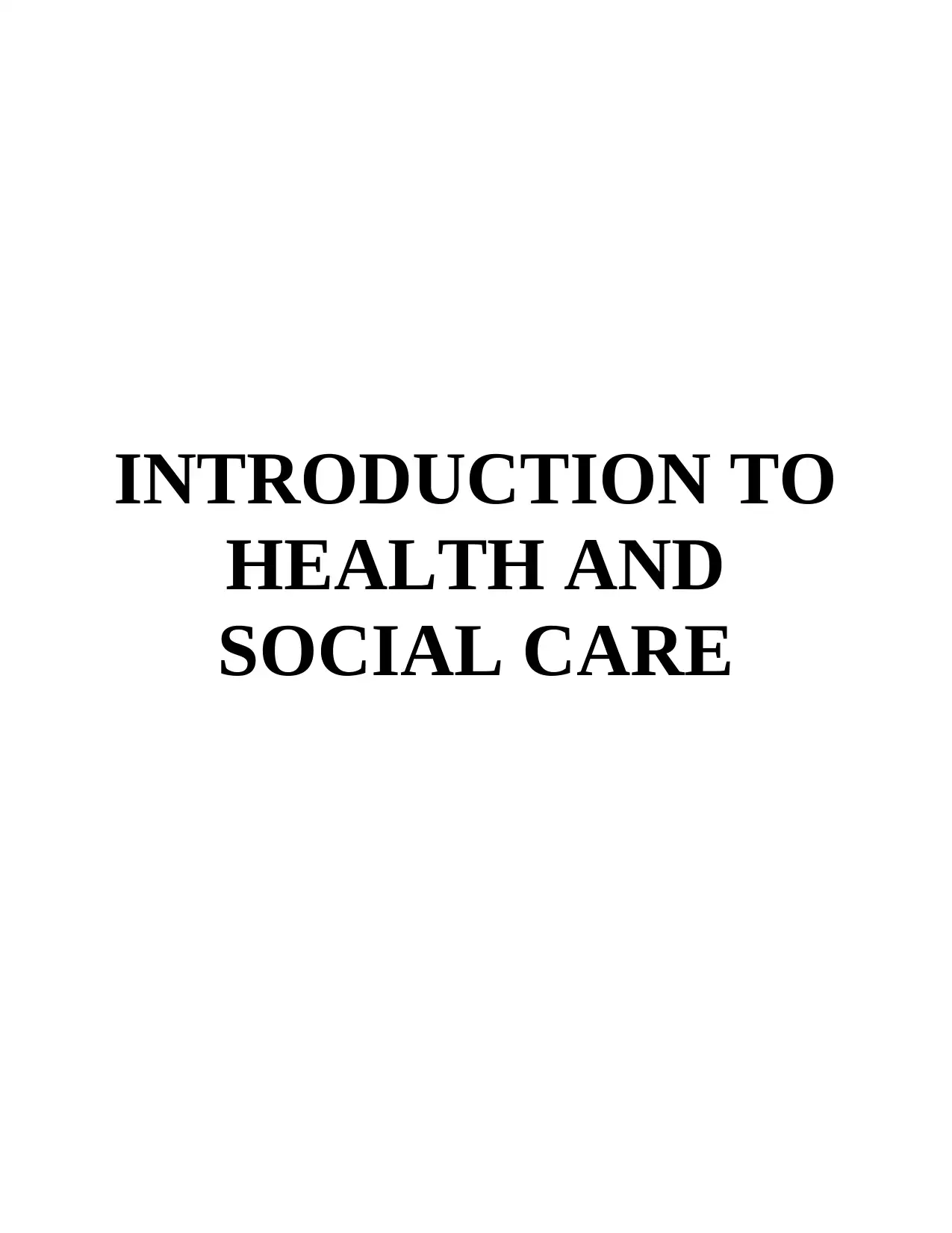
INTRODUCTION TO
HEALTH AND
SOCIAL CARE
HEALTH AND
SOCIAL CARE
Paraphrase This Document
Need a fresh take? Get an instant paraphrase of this document with our AI Paraphraser
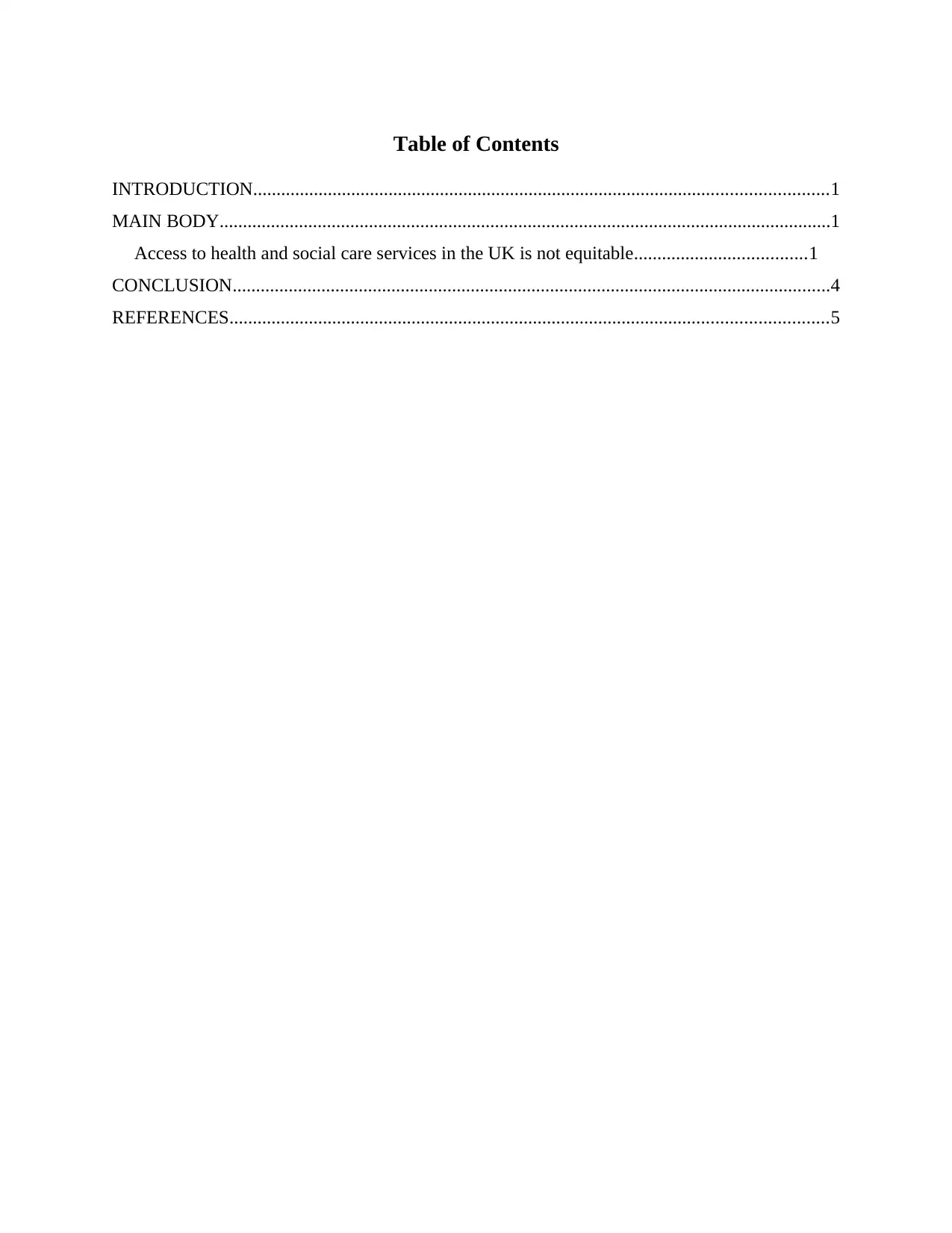
Table of Contents
INTRODUCTION...........................................................................................................................1
MAIN BODY...................................................................................................................................1
Access to health and social care services in the UK is not equitable.....................................1
CONCLUSION................................................................................................................................4
REFERENCES................................................................................................................................5
INTRODUCTION...........................................................................................................................1
MAIN BODY...................................................................................................................................1
Access to health and social care services in the UK is not equitable.....................................1
CONCLUSION................................................................................................................................4
REFERENCES................................................................................................................................5
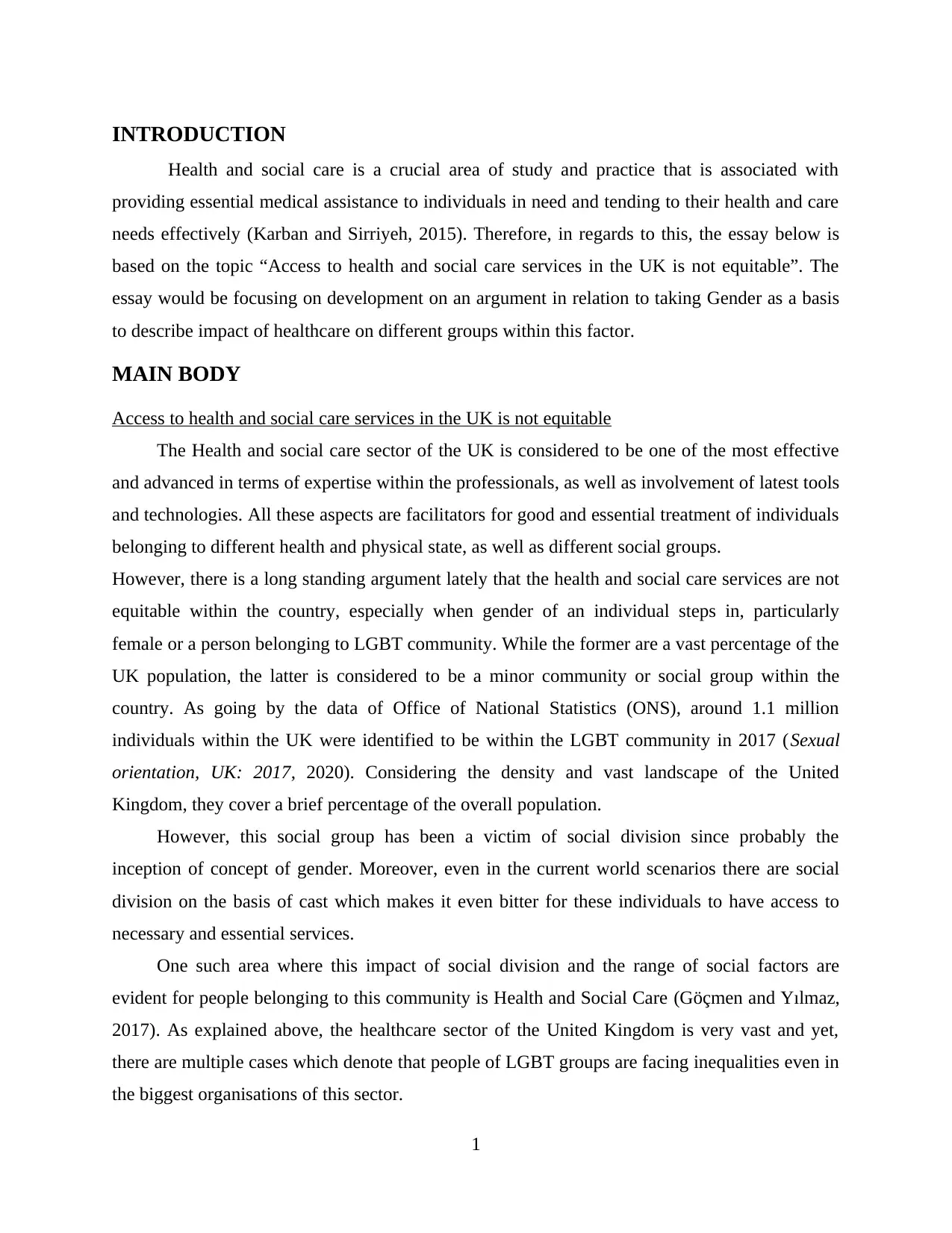
INTRODUCTION
Health and social care is a crucial area of study and practice that is associated with
providing essential medical assistance to individuals in need and tending to their health and care
needs effectively (Karban and Sirriyeh, 2015). Therefore, in regards to this, the essay below is
based on the topic “Access to health and social care services in the UK is not equitable”. The
essay would be focusing on development on an argument in relation to taking Gender as a basis
to describe impact of healthcare on different groups within this factor.
MAIN BODY
Access to health and social care services in the UK is not equitable
The Health and social care sector of the UK is considered to be one of the most effective
and advanced in terms of expertise within the professionals, as well as involvement of latest tools
and technologies. All these aspects are facilitators for good and essential treatment of individuals
belonging to different health and physical state, as well as different social groups.
However, there is a long standing argument lately that the health and social care services are not
equitable within the country, especially when gender of an individual steps in, particularly
female or a person belonging to LGBT community. While the former are a vast percentage of the
UK population, the latter is considered to be a minor community or social group within the
country. As going by the data of Office of National Statistics (ONS), around 1.1 million
individuals within the UK were identified to be within the LGBT community in 2017 (Sexual
orientation, UK: 2017, 2020). Considering the density and vast landscape of the United
Kingdom, they cover a brief percentage of the overall population.
However, this social group has been a victim of social division since probably the
inception of concept of gender. Moreover, even in the current world scenarios there are social
division on the basis of cast which makes it even bitter for these individuals to have access to
necessary and essential services.
One such area where this impact of social division and the range of social factors are
evident for people belonging to this community is Health and Social Care (Göçmen and Yılmaz,
2017). As explained above, the healthcare sector of the United Kingdom is very vast and yet,
there are multiple cases which denote that people of LGBT groups are facing inequalities even in
the biggest organisations of this sector.
1
Health and social care is a crucial area of study and practice that is associated with
providing essential medical assistance to individuals in need and tending to their health and care
needs effectively (Karban and Sirriyeh, 2015). Therefore, in regards to this, the essay below is
based on the topic “Access to health and social care services in the UK is not equitable”. The
essay would be focusing on development on an argument in relation to taking Gender as a basis
to describe impact of healthcare on different groups within this factor.
MAIN BODY
Access to health and social care services in the UK is not equitable
The Health and social care sector of the UK is considered to be one of the most effective
and advanced in terms of expertise within the professionals, as well as involvement of latest tools
and technologies. All these aspects are facilitators for good and essential treatment of individuals
belonging to different health and physical state, as well as different social groups.
However, there is a long standing argument lately that the health and social care services are not
equitable within the country, especially when gender of an individual steps in, particularly
female or a person belonging to LGBT community. While the former are a vast percentage of the
UK population, the latter is considered to be a minor community or social group within the
country. As going by the data of Office of National Statistics (ONS), around 1.1 million
individuals within the UK were identified to be within the LGBT community in 2017 (Sexual
orientation, UK: 2017, 2020). Considering the density and vast landscape of the United
Kingdom, they cover a brief percentage of the overall population.
However, this social group has been a victim of social division since probably the
inception of concept of gender. Moreover, even in the current world scenarios there are social
division on the basis of cast which makes it even bitter for these individuals to have access to
necessary and essential services.
One such area where this impact of social division and the range of social factors are
evident for people belonging to this community is Health and Social Care (Göçmen and Yılmaz,
2017). As explained above, the healthcare sector of the United Kingdom is very vast and yet,
there are multiple cases which denote that people of LGBT groups are facing inequalities even in
the biggest organisations of this sector.
1
⊘ This is a preview!⊘
Do you want full access?
Subscribe today to unlock all pages.

Trusted by 1+ million students worldwide
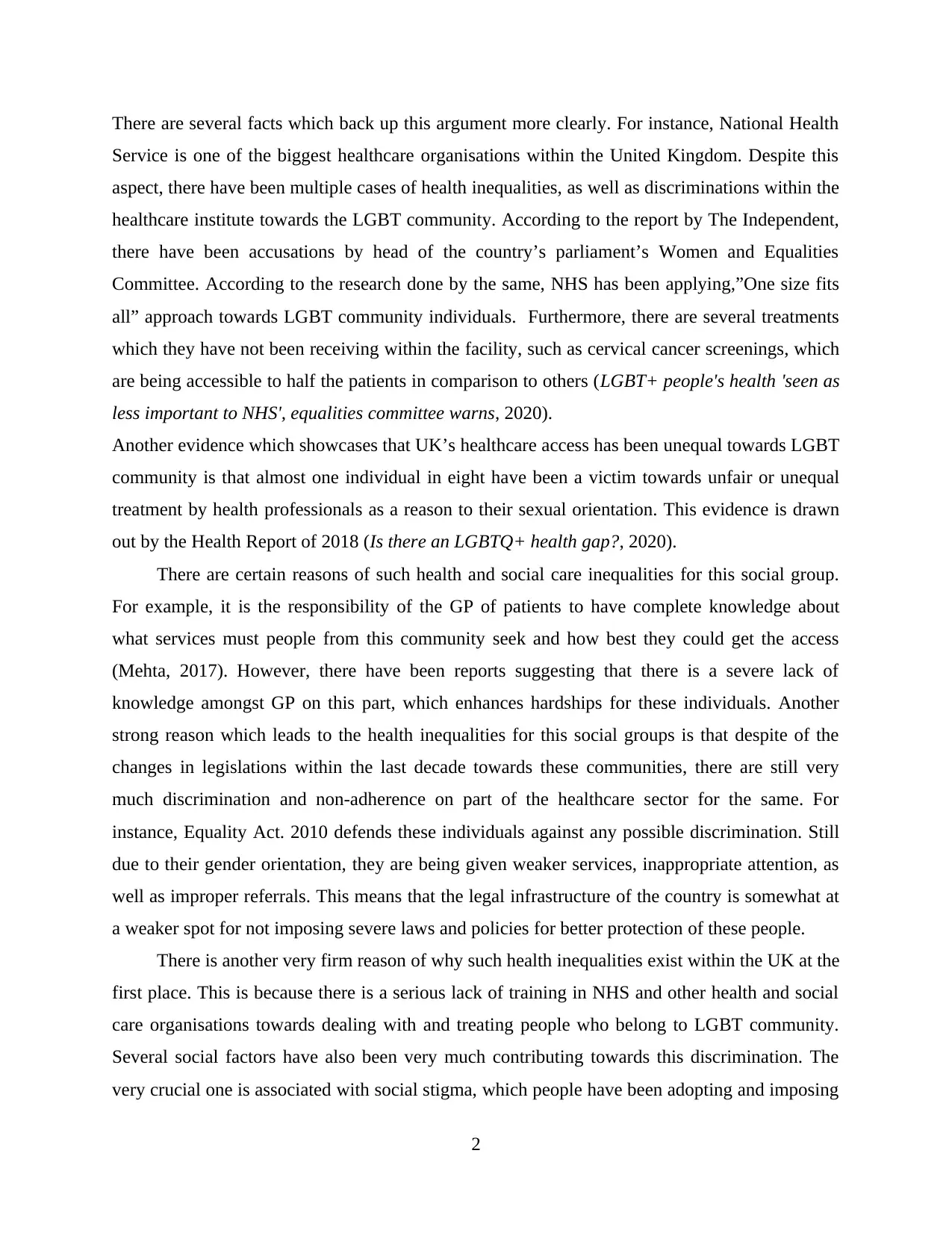
There are several facts which back up this argument more clearly. For instance, National Health
Service is one of the biggest healthcare organisations within the United Kingdom. Despite this
aspect, there have been multiple cases of health inequalities, as well as discriminations within the
healthcare institute towards the LGBT community. According to the report by The Independent,
there have been accusations by head of the country’s parliament’s Women and Equalities
Committee. According to the research done by the same, NHS has been applying,”One size fits
all” approach towards LGBT community individuals. Furthermore, there are several treatments
which they have not been receiving within the facility, such as cervical cancer screenings, which
are being accessible to half the patients in comparison to others (LGBT+ people's health 'seen as
less important to NHS', equalities committee warns, 2020).
Another evidence which showcases that UK’s healthcare access has been unequal towards LGBT
community is that almost one individual in eight have been a victim towards unfair or unequal
treatment by health professionals as a reason to their sexual orientation. This evidence is drawn
out by the Health Report of 2018 (Is there an LGBTQ+ health gap?, 2020).
There are certain reasons of such health and social care inequalities for this social group.
For example, it is the responsibility of the GP of patients to have complete knowledge about
what services must people from this community seek and how best they could get the access
(Mehta, 2017). However, there have been reports suggesting that there is a severe lack of
knowledge amongst GP on this part, which enhances hardships for these individuals. Another
strong reason which leads to the health inequalities for this social groups is that despite of the
changes in legislations within the last decade towards these communities, there are still very
much discrimination and non-adherence on part of the healthcare sector for the same. For
instance, Equality Act. 2010 defends these individuals against any possible discrimination. Still
due to their gender orientation, they are being given weaker services, inappropriate attention, as
well as improper referrals. This means that the legal infrastructure of the country is somewhat at
a weaker spot for not imposing severe laws and policies for better protection of these people.
There is another very firm reason of why such health inequalities exist within the UK at the
first place. This is because there is a serious lack of training in NHS and other health and social
care organisations towards dealing with and treating people who belong to LGBT community.
Several social factors have also been very much contributing towards this discrimination. The
very crucial one is associated with social stigma, which people have been adopting and imposing
2
Service is one of the biggest healthcare organisations within the United Kingdom. Despite this
aspect, there have been multiple cases of health inequalities, as well as discriminations within the
healthcare institute towards the LGBT community. According to the report by The Independent,
there have been accusations by head of the country’s parliament’s Women and Equalities
Committee. According to the research done by the same, NHS has been applying,”One size fits
all” approach towards LGBT community individuals. Furthermore, there are several treatments
which they have not been receiving within the facility, such as cervical cancer screenings, which
are being accessible to half the patients in comparison to others (LGBT+ people's health 'seen as
less important to NHS', equalities committee warns, 2020).
Another evidence which showcases that UK’s healthcare access has been unequal towards LGBT
community is that almost one individual in eight have been a victim towards unfair or unequal
treatment by health professionals as a reason to their sexual orientation. This evidence is drawn
out by the Health Report of 2018 (Is there an LGBTQ+ health gap?, 2020).
There are certain reasons of such health and social care inequalities for this social group.
For example, it is the responsibility of the GP of patients to have complete knowledge about
what services must people from this community seek and how best they could get the access
(Mehta, 2017). However, there have been reports suggesting that there is a severe lack of
knowledge amongst GP on this part, which enhances hardships for these individuals. Another
strong reason which leads to the health inequalities for this social groups is that despite of the
changes in legislations within the last decade towards these communities, there are still very
much discrimination and non-adherence on part of the healthcare sector for the same. For
instance, Equality Act. 2010 defends these individuals against any possible discrimination. Still
due to their gender orientation, they are being given weaker services, inappropriate attention, as
well as improper referrals. This means that the legal infrastructure of the country is somewhat at
a weaker spot for not imposing severe laws and policies for better protection of these people.
There is another very firm reason of why such health inequalities exist within the UK at the
first place. This is because there is a serious lack of training in NHS and other health and social
care organisations towards dealing with and treating people who belong to LGBT community.
Several social factors have also been very much contributing towards this discrimination. The
very crucial one is associated with social stigma, which people have been adopting and imposing
2
Paraphrase This Document
Need a fresh take? Get an instant paraphrase of this document with our AI Paraphraser
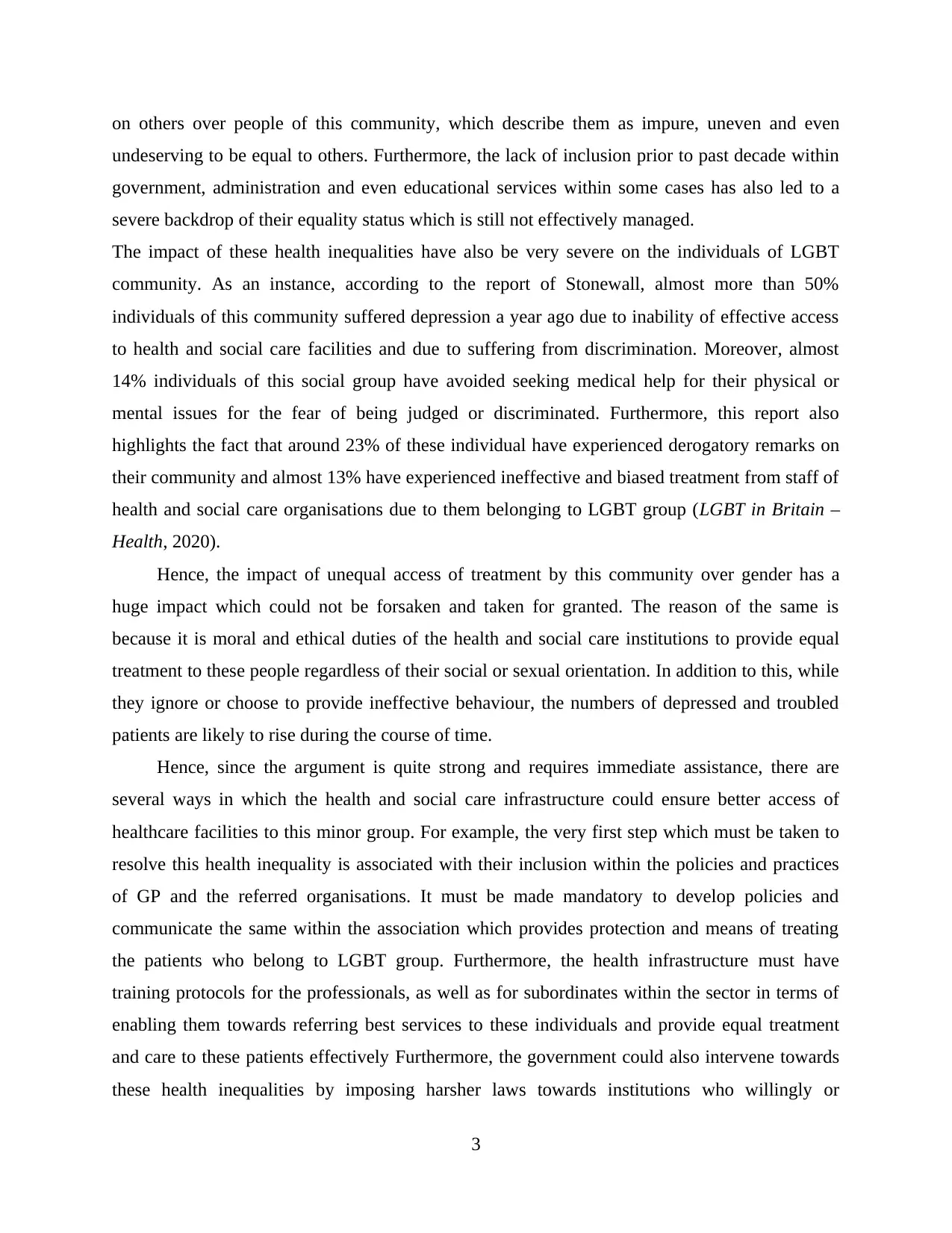
on others over people of this community, which describe them as impure, uneven and even
undeserving to be equal to others. Furthermore, the lack of inclusion prior to past decade within
government, administration and even educational services within some cases has also led to a
severe backdrop of their equality status which is still not effectively managed.
The impact of these health inequalities have also be very severe on the individuals of LGBT
community. As an instance, according to the report of Stonewall, almost more than 50%
individuals of this community suffered depression a year ago due to inability of effective access
to health and social care facilities and due to suffering from discrimination. Moreover, almost
14% individuals of this social group have avoided seeking medical help for their physical or
mental issues for the fear of being judged or discriminated. Furthermore, this report also
highlights the fact that around 23% of these individual have experienced derogatory remarks on
their community and almost 13% have experienced ineffective and biased treatment from staff of
health and social care organisations due to them belonging to LGBT group (LGBT in Britain –
Health, 2020).
Hence, the impact of unequal access of treatment by this community over gender has a
huge impact which could not be forsaken and taken for granted. The reason of the same is
because it is moral and ethical duties of the health and social care institutions to provide equal
treatment to these people regardless of their social or sexual orientation. In addition to this, while
they ignore or choose to provide ineffective behaviour, the numbers of depressed and troubled
patients are likely to rise during the course of time.
Hence, since the argument is quite strong and requires immediate assistance, there are
several ways in which the health and social care infrastructure could ensure better access of
healthcare facilities to this minor group. For example, the very first step which must be taken to
resolve this health inequality is associated with their inclusion within the policies and practices
of GP and the referred organisations. It must be made mandatory to develop policies and
communicate the same within the association which provides protection and means of treating
the patients who belong to LGBT group. Furthermore, the health infrastructure must have
training protocols for the professionals, as well as for subordinates within the sector in terms of
enabling them towards referring best services to these individuals and provide equal treatment
and care to these patients effectively Furthermore, the government could also intervene towards
these health inequalities by imposing harsher laws towards institutions who willingly or
3
undeserving to be equal to others. Furthermore, the lack of inclusion prior to past decade within
government, administration and even educational services within some cases has also led to a
severe backdrop of their equality status which is still not effectively managed.
The impact of these health inequalities have also be very severe on the individuals of LGBT
community. As an instance, according to the report of Stonewall, almost more than 50%
individuals of this community suffered depression a year ago due to inability of effective access
to health and social care facilities and due to suffering from discrimination. Moreover, almost
14% individuals of this social group have avoided seeking medical help for their physical or
mental issues for the fear of being judged or discriminated. Furthermore, this report also
highlights the fact that around 23% of these individual have experienced derogatory remarks on
their community and almost 13% have experienced ineffective and biased treatment from staff of
health and social care organisations due to them belonging to LGBT group (LGBT in Britain –
Health, 2020).
Hence, the impact of unequal access of treatment by this community over gender has a
huge impact which could not be forsaken and taken for granted. The reason of the same is
because it is moral and ethical duties of the health and social care institutions to provide equal
treatment to these people regardless of their social or sexual orientation. In addition to this, while
they ignore or choose to provide ineffective behaviour, the numbers of depressed and troubled
patients are likely to rise during the course of time.
Hence, since the argument is quite strong and requires immediate assistance, there are
several ways in which the health and social care infrastructure could ensure better access of
healthcare facilities to this minor group. For example, the very first step which must be taken to
resolve this health inequality is associated with their inclusion within the policies and practices
of GP and the referred organisations. It must be made mandatory to develop policies and
communicate the same within the association which provides protection and means of treating
the patients who belong to LGBT group. Furthermore, the health infrastructure must have
training protocols for the professionals, as well as for subordinates within the sector in terms of
enabling them towards referring best services to these individuals and provide equal treatment
and care to these patients effectively Furthermore, the government could also intervene towards
these health inequalities by imposing harsher laws towards institutions who willingly or
3
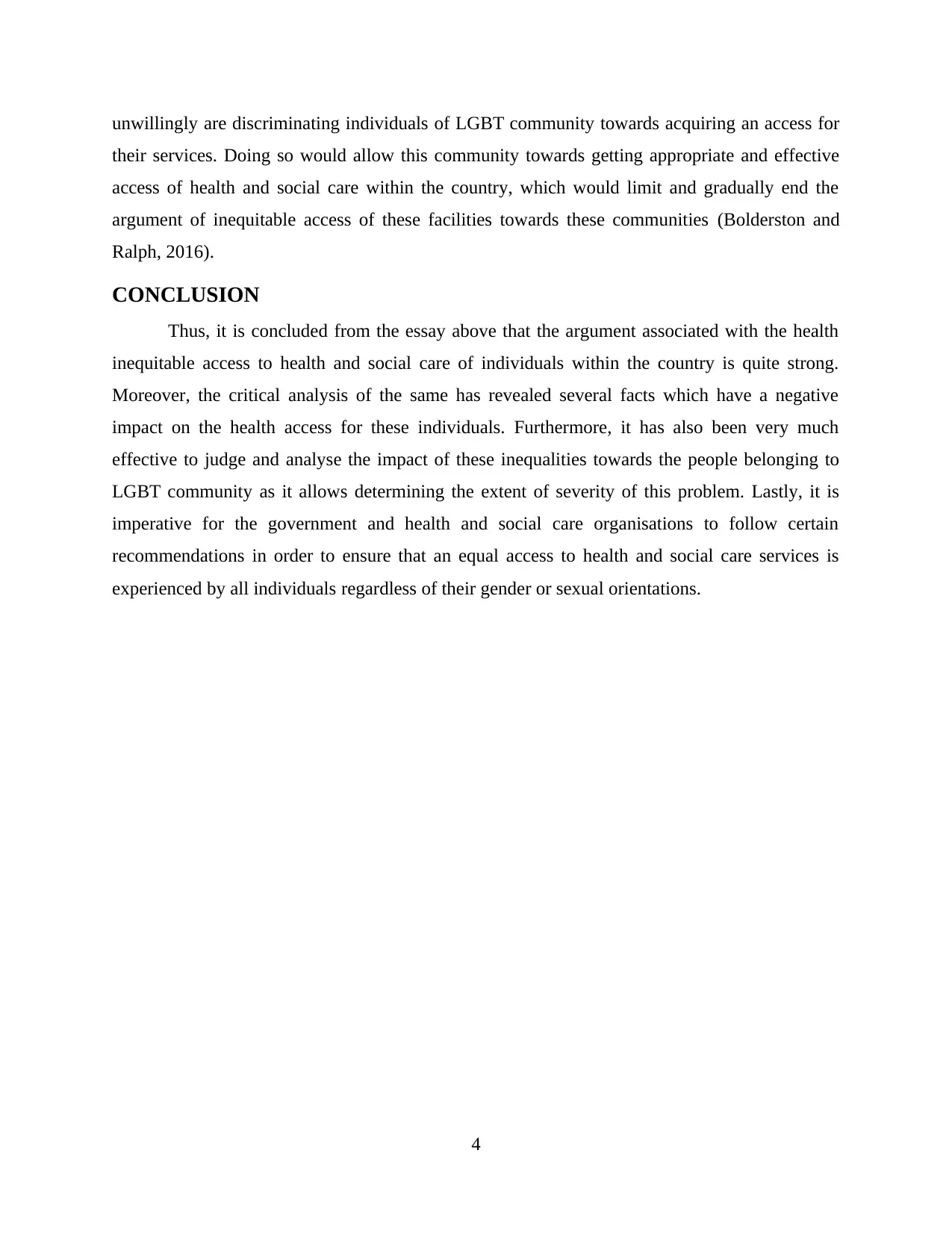
unwillingly are discriminating individuals of LGBT community towards acquiring an access for
their services. Doing so would allow this community towards getting appropriate and effective
access of health and social care within the country, which would limit and gradually end the
argument of inequitable access of these facilities towards these communities (Bolderston and
Ralph, 2016).
CONCLUSION
Thus, it is concluded from the essay above that the argument associated with the health
inequitable access to health and social care of individuals within the country is quite strong.
Moreover, the critical analysis of the same has revealed several facts which have a negative
impact on the health access for these individuals. Furthermore, it has also been very much
effective to judge and analyse the impact of these inequalities towards the people belonging to
LGBT community as it allows determining the extent of severity of this problem. Lastly, it is
imperative for the government and health and social care organisations to follow certain
recommendations in order to ensure that an equal access to health and social care services is
experienced by all individuals regardless of their gender or sexual orientations.
4
their services. Doing so would allow this community towards getting appropriate and effective
access of health and social care within the country, which would limit and gradually end the
argument of inequitable access of these facilities towards these communities (Bolderston and
Ralph, 2016).
CONCLUSION
Thus, it is concluded from the essay above that the argument associated with the health
inequitable access to health and social care of individuals within the country is quite strong.
Moreover, the critical analysis of the same has revealed several facts which have a negative
impact on the health access for these individuals. Furthermore, it has also been very much
effective to judge and analyse the impact of these inequalities towards the people belonging to
LGBT community as it allows determining the extent of severity of this problem. Lastly, it is
imperative for the government and health and social care organisations to follow certain
recommendations in order to ensure that an equal access to health and social care services is
experienced by all individuals regardless of their gender or sexual orientations.
4
⊘ This is a preview!⊘
Do you want full access?
Subscribe today to unlock all pages.

Trusted by 1+ million students worldwide
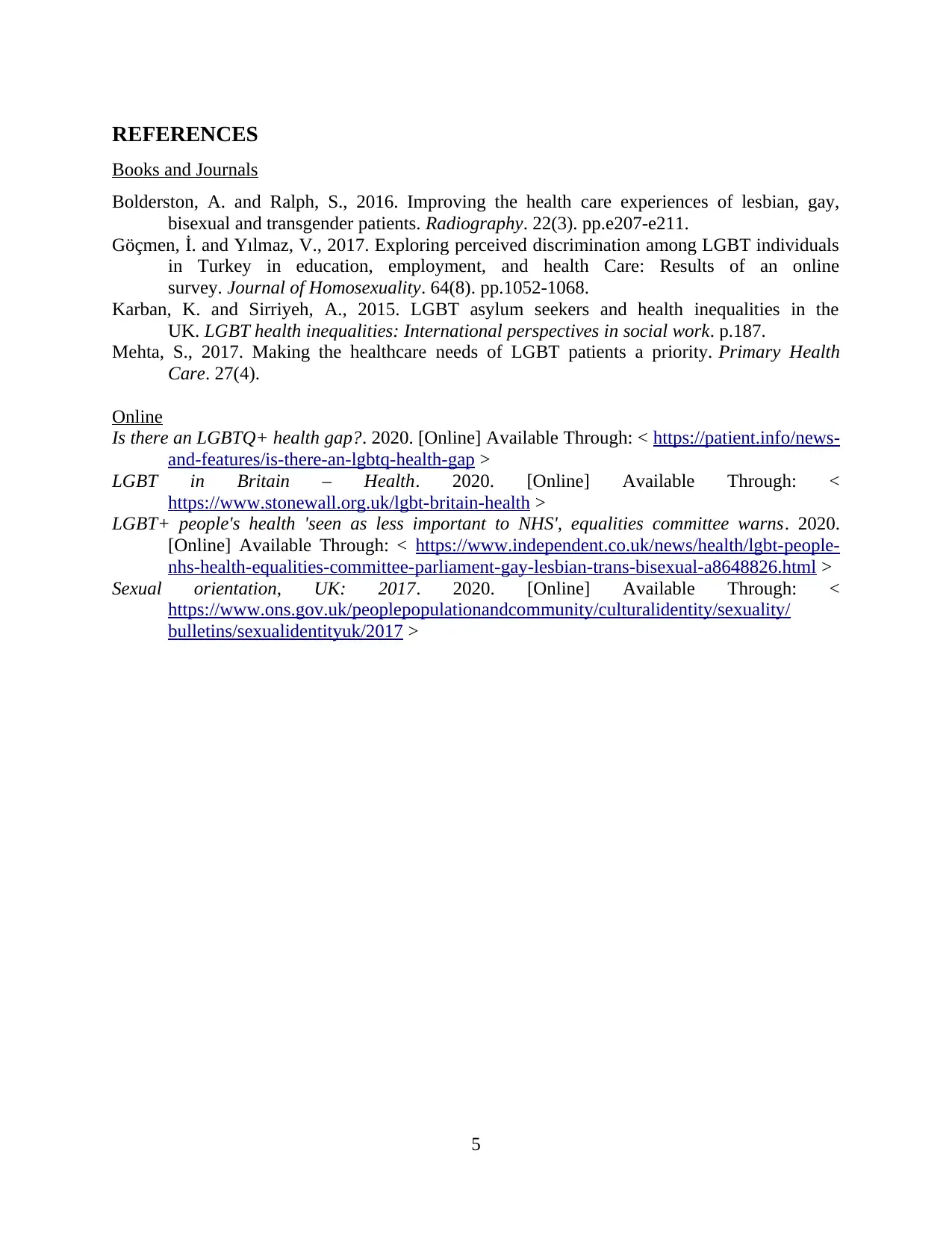
REFERENCES
Books and Journals
Bolderston, A. and Ralph, S., 2016. Improving the health care experiences of lesbian, gay,
bisexual and transgender patients. Radiography. 22(3). pp.e207-e211.
Göçmen, İ. and Yılmaz, V., 2017. Exploring perceived discrimination among LGBT individuals
in Turkey in education, employment, and health Care: Results of an online
survey. Journal of Homosexuality. 64(8). pp.1052-1068.
Karban, K. and Sirriyeh, A., 2015. LGBT asylum seekers and health inequalities in the
UK. LGBT health inequalities: International perspectives in social work. p.187.
Mehta, S., 2017. Making the healthcare needs of LGBT patients a priority. Primary Health
Care. 27(4).
Online
Is there an LGBTQ+ health gap?. 2020. [Online] Available Through: < https://patient.info/news-
and-features/is-there-an-lgbtq-health-gap >
LGBT in Britain – Health. 2020. [Online] Available Through: <
https://www.stonewall.org.uk/lgbt-britain-health >
LGBT+ people's health 'seen as less important to NHS', equalities committee warns. 2020.
[Online] Available Through: < https://www.independent.co.uk/news/health/lgbt-people-
nhs-health-equalities-committee-parliament-gay-lesbian-trans-bisexual-a8648826.html >
Sexual orientation, UK: 2017. 2020. [Online] Available Through: <
https://www.ons.gov.uk/peoplepopulationandcommunity/culturalidentity/sexuality/
bulletins/sexualidentityuk/2017 >
5
Books and Journals
Bolderston, A. and Ralph, S., 2016. Improving the health care experiences of lesbian, gay,
bisexual and transgender patients. Radiography. 22(3). pp.e207-e211.
Göçmen, İ. and Yılmaz, V., 2017. Exploring perceived discrimination among LGBT individuals
in Turkey in education, employment, and health Care: Results of an online
survey. Journal of Homosexuality. 64(8). pp.1052-1068.
Karban, K. and Sirriyeh, A., 2015. LGBT asylum seekers and health inequalities in the
UK. LGBT health inequalities: International perspectives in social work. p.187.
Mehta, S., 2017. Making the healthcare needs of LGBT patients a priority. Primary Health
Care. 27(4).
Online
Is there an LGBTQ+ health gap?. 2020. [Online] Available Through: < https://patient.info/news-
and-features/is-there-an-lgbtq-health-gap >
LGBT in Britain – Health. 2020. [Online] Available Through: <
https://www.stonewall.org.uk/lgbt-britain-health >
LGBT+ people's health 'seen as less important to NHS', equalities committee warns. 2020.
[Online] Available Through: < https://www.independent.co.uk/news/health/lgbt-people-
nhs-health-equalities-committee-parliament-gay-lesbian-trans-bisexual-a8648826.html >
Sexual orientation, UK: 2017. 2020. [Online] Available Through: <
https://www.ons.gov.uk/peoplepopulationandcommunity/culturalidentity/sexuality/
bulletins/sexualidentityuk/2017 >
5
1 out of 7
Related Documents
Your All-in-One AI-Powered Toolkit for Academic Success.
+13062052269
info@desklib.com
Available 24*7 on WhatsApp / Email
![[object Object]](/_next/static/media/star-bottom.7253800d.svg)
Unlock your academic potential
Copyright © 2020–2026 A2Z Services. All Rights Reserved. Developed and managed by ZUCOL.





